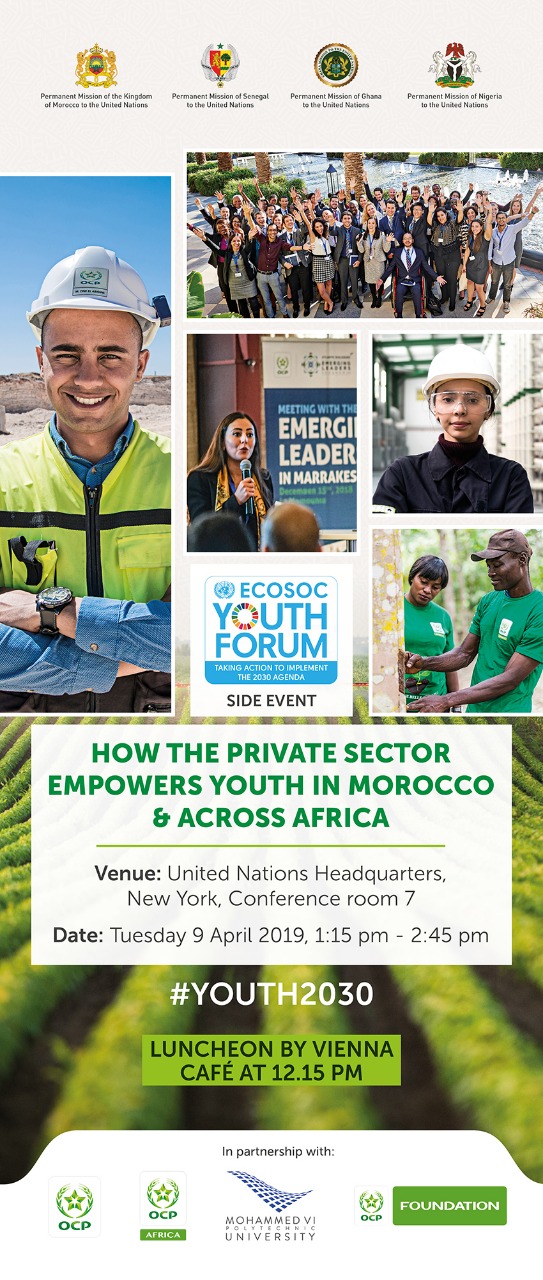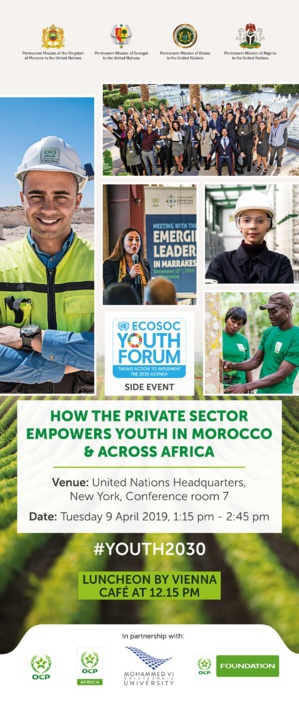By the end of the century, Africa will gather three quarters of the world’s population global increase. While such demographic dynamism can stimulate the continent’s economic and social development, it can also prove to be a factor of instability. Governments will have to ensure youth are properly integrated into the economy to avoid social turmoil. In fact, to absorb new entrants in the labour market, 12 million new jobs will have to be created throughout Africa by 2035.
This issue was debated during the 2019 UN Youth Forum, which took place in early April, with many side events focusing on how empowering young people in Africa, especially through employment, can bring prosperity and development to the continent.
In a separate side event, held by the governments of Morocco, Nigeria, Ghana and Senegal, participants discussed how the private sector contributes to youth empowerment and employment across Africa.
Ms. Jayathma Wickramanayake, the UN Secretary-General's Envoy for Youth, stressed the importance of involving the private sector in the decision-making process so that they can “listen directly to the voices of young people.” She highlighted the importance of action on the issue with the fact that almost 65 million young people around the world are unemployed.
Nigeria’s Permanent Representative to the UN, H.E. Prof. Tijjani Muhammad-Bande, noted that small and medium-sized private enterprises have become the main source of jobs for young people in Nigeria.
OCP Group, a Moroccan company and a world leader in the phosphate fertilizer industry, presented its belief that the private sector should place the “Human” at the heart of its strategy in order to become an impactful social actor. OCP Group also reiterated its commitment to assist Africa in developing and leveraging all of its strength, and in particular African youth, through education and professional opportunities.
While the continent has abundant mineral resources, it also has great potential in agribusiness. Africa is in a position to not only achieve food security, but also become a key contributor to global food security. Agriculture and farming, especially in today’s age of digital and innovation, can be a tremendous source of opportunities for youth. This is one of the reasons why OCP Group created a world-class research university in Morocco designed to tackle Africa’s biggest challenges in terms of education, research, innovation and entrepreneurship to become a bridge of knowledge between Africa and the rest of the world. With the African youth population expected to reach 830 million by 2050, a trained and educated workforce will be a precious resource for the private sector.
Moreover, the issue of development and youth migration was debated during an event co-hosted by the International Migration Organization (IOM). In 2017, of the 258 million international migrants, 11% were below 24 years old. Insecurity as well as the lack of job creation and employment opportunities forced many young Africans to leave their communities and try their luck elsewhere. Today, 1 in 3 Africans have considered emigrating and the majority of those who leave relocate to another African country (and not Europe or North America).
During this conference, IOM representatives insisted young migrants are agents of social change and economic development. They called for inclusive policies, with youth at the center, to foster their integration into their host societies and hence create the conditions to boost the host countries’ economy.
At the centre of these discussions, the focus was to enable African youth to shape their future through social and economic empowerment. Together, stakeholders, policymakers, and governments, must continue to collaborate on issues like youth employment if we are to make good on the UN’s pledges.
What is clear is that further investment is crucial to keeping trends going in the right direction. Companies and governments must do even more to make use of the huge opportunity of Africa’s youth, to ensure that the economy and job creation stay always one step ahead of a soaring population.
This issue was debated during the 2019 UN Youth Forum, which took place in early April, with many side events focusing on how empowering young people in Africa, especially through employment, can bring prosperity and development to the continent.
In a separate side event, held by the governments of Morocco, Nigeria, Ghana and Senegal, participants discussed how the private sector contributes to youth empowerment and employment across Africa.
Ms. Jayathma Wickramanayake, the UN Secretary-General's Envoy for Youth, stressed the importance of involving the private sector in the decision-making process so that they can “listen directly to the voices of young people.” She highlighted the importance of action on the issue with the fact that almost 65 million young people around the world are unemployed.
Nigeria’s Permanent Representative to the UN, H.E. Prof. Tijjani Muhammad-Bande, noted that small and medium-sized private enterprises have become the main source of jobs for young people in Nigeria.
OCP Group, a Moroccan company and a world leader in the phosphate fertilizer industry, presented its belief that the private sector should place the “Human” at the heart of its strategy in order to become an impactful social actor. OCP Group also reiterated its commitment to assist Africa in developing and leveraging all of its strength, and in particular African youth, through education and professional opportunities.
While the continent has abundant mineral resources, it also has great potential in agribusiness. Africa is in a position to not only achieve food security, but also become a key contributor to global food security. Agriculture and farming, especially in today’s age of digital and innovation, can be a tremendous source of opportunities for youth. This is one of the reasons why OCP Group created a world-class research university in Morocco designed to tackle Africa’s biggest challenges in terms of education, research, innovation and entrepreneurship to become a bridge of knowledge between Africa and the rest of the world. With the African youth population expected to reach 830 million by 2050, a trained and educated workforce will be a precious resource for the private sector.
Moreover, the issue of development and youth migration was debated during an event co-hosted by the International Migration Organization (IOM). In 2017, of the 258 million international migrants, 11% were below 24 years old. Insecurity as well as the lack of job creation and employment opportunities forced many young Africans to leave their communities and try their luck elsewhere. Today, 1 in 3 Africans have considered emigrating and the majority of those who leave relocate to another African country (and not Europe or North America).
During this conference, IOM representatives insisted young migrants are agents of social change and economic development. They called for inclusive policies, with youth at the center, to foster their integration into their host societies and hence create the conditions to boost the host countries’ economy.
At the centre of these discussions, the focus was to enable African youth to shape their future through social and economic empowerment. Together, stakeholders, policymakers, and governments, must continue to collaborate on issues like youth employment if we are to make good on the UN’s pledges.
What is clear is that further investment is crucial to keeping trends going in the right direction. Companies and governments must do even more to make use of the huge opportunity of Africa’s youth, to ensure that the economy and job creation stay always one step ahead of a soaring population.


 Youth employment in Africa discussed during the UN Youth Forum
Youth employment in Africa discussed during the UN Youth Forum





 Companies
Companies